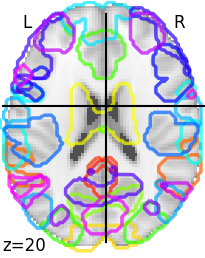
fMRI Parcellation

Information
The estimated time to complete this training module is 1.5h.
The prerequisites to take this module are:
- the installation module.
- the python data analysis module (recommended for Python familiarity).
- the fmri connectivity module
Contact Desiree Lussier if you have questions on this module, or if you want to check that you completed successfully all the exercises.
Resources
The first portion of this module was presented by Pierre Bellec during Brainhack School 2020 and the notebook was created by Desiree Lussier for this module.
The tutorial slides are available here.
The video presentation is available here:
Exercise
- Watch the video presentation by Pierre Bellec and go over the slides.
- Download the notebook created for this module found here
- Run the notebook to view the parcellation for the atlas example.
- Create new code blocks in your notebook and the example to retrieve three other atlases using Nilearn datasets, the documentation for which you can find here, and view the atlases in your notebook.
- Answer the discussion at the bottom of the notebook in the markdown block provided and save.
- Follow up with Désirée Lussier to and validate you completed the exercise.
- 🎉 🎉 🎉 you completed this training module! 🎉 🎉 🎉
More resources
You can watch my talk on dynamic parcellation and the Dypac package (in French) here or (in English) here.
For information on or to install the Dynamic Parcel Aggregation with Clustering (Dypac) package for Python see PyPi here or the Github repository here, with a Jupyter notebook demo you can download and run here here
If you are curious about how the embeddings of different parcellations compare you can check out my OHBM 2021 poster here and check out Sebastian Urchs’ paper on the MIST atlas here
You can also check out the Nilearn (unstable development version) tutorials here